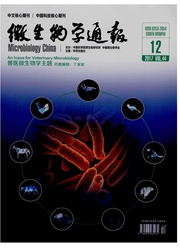

 中文摘要:
中文摘要:
【目的】鉴定白念珠菌肌醇多磷酸激酶Kcs1蛋白,并探索Kcs1在该病原菌细胞自噬、菌丝发育及致病过程中的功能。【方法】采用二步PCR介导的同源重组方法,构建白念珠菌KCS1基因缺失菌株kcs1Δ/Δ及回补菌株KCS1c;采用氮饥饿敏感性测定及GFP-Atg8自噬报告系统,测定KCS1缺失对白念珠菌自噬过程的影响;采用菌丝诱导培养,测定KCS1缺失对白念珠菌菌丝发育能力的影响;采用巨噬细胞模型及小鼠系统性感染模型,分析KCS1缺失对白念珠菌感染宿主能力的影响。【结果】KCS1缺失造成白念珠菌氮饥饿耐受能力降低,氮饥饿条件下自噬相关蛋白Atg8的降解及转运水平下降,菌丝发育变缓,对巨噬细胞耐受及损伤能力减弱,但不影响菌株的小鼠系统性感染能力。【结论】白念珠菌肌醇多磷酸激酶Kcs1在细胞自噬、菌丝发育、与巨噬细胞相互作用等方面发挥重要作用。
 英文摘要:
英文摘要:
[Objective] To identify the inositol polyphosphate kinase Kcs1 in Candida albicans and study the role of Kcs1 in autophagy, hyphal growth and virulence. [Methods] The mutant kcs1Δ/Δ and the reconstituted strain KCS1c were constructed by homologous recombination. Transport and degradation capability of the autophagy-related protein Atg8 were determined by fluorescence microscopy and Western blotting under nitrogen starvation. Hyphal development ability was assayed using hypha-inducing medium. The virulence of C. albicans was determined using the macrophage model and the mouse systemic infection model. [Results] Nitrogen starvation experiment and GFP-Atg8 analysis revealed that deletion of KCS1 caused defect in transport of Atg8 to vacuole and degradation of Atg8 in the vacuole. Moreover, the kcs1Δ/Δ mutant attenuated the ability of hyphal development. In addition, the kcs1Δ/Δ mutant decreased the ability of fighting against microphage attacks. However, the ability of systemic infection was not impaired by deletion of KCS1. [Conclusion] The inositol polyphosphate kinase Kcs1 played an important role in various physiological processes in C. albicans, including autophagy, hyphal development and macrophage sensitivity.
 同期刊论文项目
同期刊论文项目
 同项目期刊论文
同项目期刊论文
 期刊信息
期刊信息
